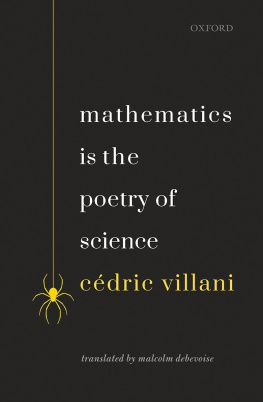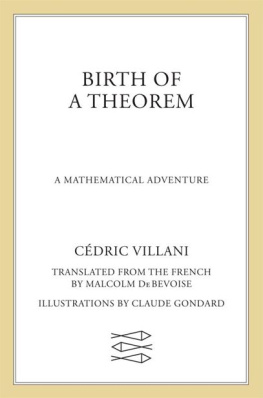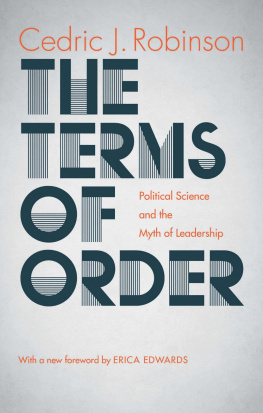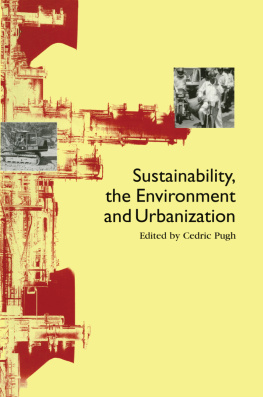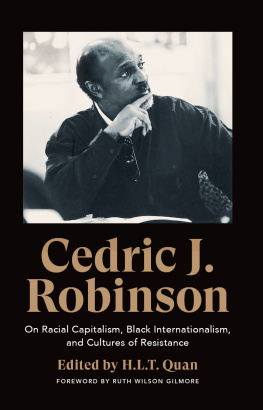Cédric Villani - Mathematics is the poetry of science
Here you can read online Cédric Villani - Mathematics is the poetry of science full text of the book (entire story) in english for free. Download pdf and epub, get meaning, cover and reviews about this ebook. year: 2020, publisher: OUP Oxford, genre: Religion. Description of the work, (preface) as well as reviews are available. Best literature library LitArk.com created for fans of good reading and offers a wide selection of genres:
Romance novel
Science fiction
Adventure
Detective
Science
History
Home and family
Prose
Art
Politics
Computer
Non-fiction
Religion
Business
Children
Humor
Choose a favorite category and find really read worthwhile books. Enjoy immersion in the world of imagination, feel the emotions of the characters or learn something new for yourself, make an fascinating discovery.
- Book:Mathematics is the poetry of science
- Author:
- Publisher:OUP Oxford
- Genre:
- Year:2020
- Rating:3 / 5
- Favourites:Add to favourites
- Your mark:
- 60
- 1
- 2
- 3
- 4
- 5
Mathematics is the poetry of science: summary, description and annotation
We offer to read an annotation, description, summary or preface (depends on what the author of the book "Mathematics is the poetry of science" wrote himself). If you haven't found the necessary information about the book — write in the comments, we will try to find it.
Mathematics is the poetry of science — read online for free the complete book (whole text) full work
Below is the text of the book, divided by pages. System saving the place of the last page read, allows you to conveniently read the book "Mathematics is the poetry of science" online for free, without having to search again every time where you left off. Put a bookmark, and you can go to the page where you finished reading at any time.
Font size:
Interval:
Bookmark:


Great Clarendon Street, Oxford, OX2 6DP, United Kingdom
Oxford University Press is a department of the University of Oxford. It furthers the Universitys objective of excellence in research, scholarship, and education by publishing worldwide. Oxford is a registered trade mark of Oxford University Press in the UK and in certain other countries
Cdric Villani 2020
The moral rights of the author have been asserted
First Edition published in 2020
Impression: 1
All rights reserved. No part of this publication may be reproduced, stored in a retrieval system, or transmitted, in any form or by any means, without the prior permission in writing of Oxford University Press, or as expressly permitted by law, by licence or under terms agreed with the appropriate reprographics rights organization. Enquiries concerning reproduction outside the scope of the above should be sent to the Rights Department, Oxford University Press, at the address above
You must not circulate this work in any other form and you must impose this same condition on any acquirer
Published in the United States of America by Oxford University Press
198 Madison Avenue, New York, NY 10016, United States of America
British Library Cataloguing in Publication Data
Data available
Library of Congress Control Number: 2019953022
ISBN 9780198846437
ebook ISBN 9780192585462
Printed and bound by CPI Group (UK) Ltd, Croydon, CR0 4YY
Links to third party websites are provided by Oxford in good faith and for information only. Oxford disclaims any responsibility for the materials contained in any third party website referenced in this work.
What relationship does science bear to literature, and, more particularly, mathematics to poetry? At first sight, the answer is simple: none at all! It is often said that science disenchants the world, empties it of its poetry; that it puts turbines and machines where once there had been elves and fairies. Wasnt the moon more beautiful before human beings walked on its surface and left their landing equipment behind? Let me try to reply to the question by briefly considering the various arguments that can be made for and against the existence of such a relationship.
Science is not poetic, for it rests on a certain conception of progress, the idea that knowledge advances by building on prior results, which are then gradually forgotten or at least deprived of their former prominence. Art, by contrast, is an unending landscape of small islands of more or less equal extent and importance. On the one hand, there is the makeshift ladder that scientists go on indefatigably constructing for themselves, each one fighting to get on top of the shoulders of the one before him, and, on the other, the timeless archipelago where artists have always lived in peace with one another and always will.
A second argument concerns refutability. One of the basic tenets of science is that all claims must be disprovable. In principle, anything that may be asserted is liable to be disconfirmed by experiment. In art, such a notion has no place. A work of art is neither true nor false; it is irrefutable.
There is also the idea that the discovery of a natural phenomenon does not really depend on the scientist who first draws attention to it. Electricity, if it had not been discovered by Gilbert, would have been discovered sooner or later by someone else; so too radioactivity, if it had not been discovered by Becquerel, and so on. It often occurs, moreover, that discoveries are made simultaneously in different places. The personal histories of scientists therefore do not occupy a central place in scientific investigation. Among artists, the opposite is true. No one other than Beethoven could have composed the Ode to Joy; no one other than Picasso could have painted Guernica. Whereas art is profoundly individual, science is a collective enterprise.
Still another argument involves the status of experiment. Art and science both conduct experiments, but in ways that differ in a crucial respect. The scientist introduces a system of measurement while standing apart from what is being measured. The artist, by contrast, is part of the experiment that he carries out; he includes himself in what he observes.
Finally, there is the dependence of science on technology, since it advances by means of increasingly precise measurements that constantly require new measuring instruments. The artist, for his part, freely chooses from among existing techniques. Great works of art can still be made using pencil and paper.
First, scientists see themselves as creators. I have spent forty years of my life trying to be creative in physics, the French Nobel laureate Pierre-Gilles de Gennes remarked. I am told that there is no creation in the sciences, but in that case my life has been pointless. Even allowing for the doubtful chance that this is an idiosyncratic opinion, if one goes back in time one finds that the distinction between art and science grows less and less clear. It must be kept in mind that originality in art is a relatively recent invention. There was a time not so very long ago that artists did not sign their works, a time when they were interested in imitating models, not in creating something new. They sought to make identical copies, to perpetuate a tradition without adding anything to it. Little by little the artists personality came to be given expression in a work of art.
Moreover, the arts and sciences issued from a common source in antiquity. Before they became sciences, medicine and astronomy and botany formed a whole with music and sculpture and architecture. The Greek philosophers brought order to this heterodox corpus by associating different activities with different purposes and laying down criteria of excellence, with the result that the new disciplines began to branch off from one another. Those disciplines that relied on concepts and rules of reasoning became sciences. Yet poetic intuition continued to have a place in them, for it often contains the seeds of theoretical research and scientific explanation. In many mythical and poetic accounts, one finds the outlines of an explanation that was to be more rigorously formulated later. Ovid and Darwin, for example, are talking at bottom about the same thing. Ovid describes it in a picturesque manner, Darwin in a precise fashion, but at the heart of each of these two very different perspectives one finds the idea of metamorphosis as the motive force of the world.
Another argument is that the artist and the scientist are animated by the same fundamental impulse, an intense desire to know, a libido sciendi, as it might well be called; and that this passion literally inhabits them, sometimes filling their lives to the point of preventing them from keeping their various interests separate from one another. Everything is an object of fascination for them, everything is grist for their mill. This is something quite different from the operation of pure reason; here reason and emotion go hand in hand. Ardor animates reason, the great physiologist Claude Bernard used to say, and reason guides ardor.
The artist and the scientist also share a common source of inspiration: a sense of wonder, of awe before the marvels of nature, that may be said to be poetic in itself, or at least capable of provoking a poetic emotion. The pleasure of watching water in bathtubs or mud puddles on sidewalks, as Richard Feynman once observed, that is what makes every child a physicist. A poet would have said the same thing, only with this differenceit is what makes every child a poet. Each of them, the poet and the scientist, retains the capacity for astonishment in an age when most people have learned no longer to be astonished by anything. Some would say that the curiosity of the scientist has more of the spirit of enchantment about it than that of the poet. Feynman himself was certainly of this opinion: What men are poets, he asked, who can speak of Jupiter as if he were a man, but if he is an immense spinning mass of methane and ammonia must remain silent? For is not the immense spinning mass something far more extraordinary? In the same way, why should we deplore the fact that men have walked on the Moon, and regret that a part of our world has been somehow disenthralled? Traveling to the Moon made it possible to send probes to Jupiter, Neptune, and the other planets, and from there to venture beyond the Solar System. Today we are in the process of cataloguing hundreds of extrasolar planets whose existence no one had even suspected a century ago.
Font size:
Interval:
Bookmark:
Similar books «Mathematics is the poetry of science»
Look at similar books to Mathematics is the poetry of science. We have selected literature similar in name and meaning in the hope of providing readers with more options to find new, interesting, not yet read works.
Discussion, reviews of the book Mathematics is the poetry of science and just readers' own opinions. Leave your comments, write what you think about the work, its meaning or the main characters. Specify what exactly you liked and what you didn't like, and why you think so.

